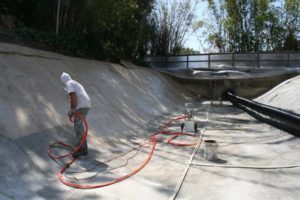When it comes to applying a coating that will eventually waterproof your spray on pond liner, there are a small variety of materials available to choose from. There are anything from paints to epoxies to other specialized coatings, some of which can be used in a pond, while others that should never be used in a pond at all.
there are a small variety of materials available to choose from. There are anything from paints to epoxies to other specialized coatings, some of which can be used in a pond, while others that should never be used in a pond at all.
But before you run out and try to find the right spray on pond liner for you, consider these few things. Do you have the skill set necessary to accomplish the task? Do you have the equipment necessary to spray on a pond liner?
Even if you do not have the skill set necessary to spray on a pond liner, it can be learned. This, like any other new task you set out to do is just something that you need to study before moving forward. The company that you purchase materials from ought to be able to give you the technical support necessary to carry out your task. I also recommend that you read my article: When to Spray Epoxy to ensure you have the right conditions before you get started.
Pond Armor, for instance, offers technical support for both their equipment and materials. This way you can be reasonably assured that you can complete your project with very few problems.
Read All Instructions Before Starting With Your Spray On Pond Liner
I would suggest that before you undertake the task of spraying a pond liner that you read all of the materials available to you. Contact the manufacturer of the equipment and materials and ask questions. A good game plan before you start will also ensure a trouble free installation.
Once you receive your equipment and materials, check everything out thoroughly before you start with applying your coating. Look for missing or broken items or pieces and notify the manufacturer right away. You’ll want to resolve that and get replacement items on their way as quickly as possible.
Read through all of the instructions first. I cannot stress this enough. It’s hard to believe but I can tell you stories about the instructions being thrown at after the packaging has been opened. If you do this, you’ll be heading into the project virtually blind and your success rate will suffer for it.
Once you have read all of the instructions, write down any questions you have. It’s even a good idea to write them down as you read through the instructions. Again, I have spoken to people who asked me a dozen questions, only to forget that final one. There’s not a lot I can do about stirring up your memory.
Take a look through your materials and equipment. Write down any questions you have in regards to your visual inspection. Have a pencil and piece of paper handy when you call in to ask questions. You’ll want to be able to review your notes later.
Installing Your Spray On Pond Liner
Once all that business is settled and you know how to use the equipment and materials, pick a time for the installation that you can readily do the project, free from distraction. Trying to spray on a pond liner while friends are stopping by will only serve to slow you down. That is, of course, unless you can recruit them.
Let’s assume that you are not the type of person that wants to get in there and do the work yourself. That’s OK too. As long as you choose a spray on pond liner installer that has done this sort of work before or is willing to learn the process, you should be in good hands. Either way, you’ll want to at least check his references prior to the hiring process.
It is important for you to investigate potential installers thoroughly. Hiring the wrong person can cost you a lot of time and money. That’s definitely something you can do without!
If you do not have the equipment, there are always options of purchasing and in some cases renting the equipment as well. If you purchase the equipment, you should follow the processes laid out above. If you plan to rent, be sure to know what is expected of you as the renter of the equipment and how the equipment should be taken care of.
It is advisable to purchase insurance on the spray on pond liner equipment that you rent, just in case some unforeseen accident happens during the installation. Make sure that you have read all of the policies regarding clean up and damage and be sure to return the equipment on time in order to avoid late charges and penalties.


